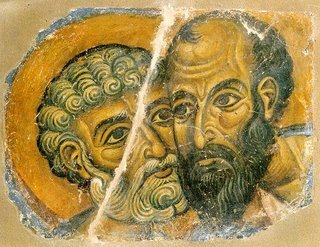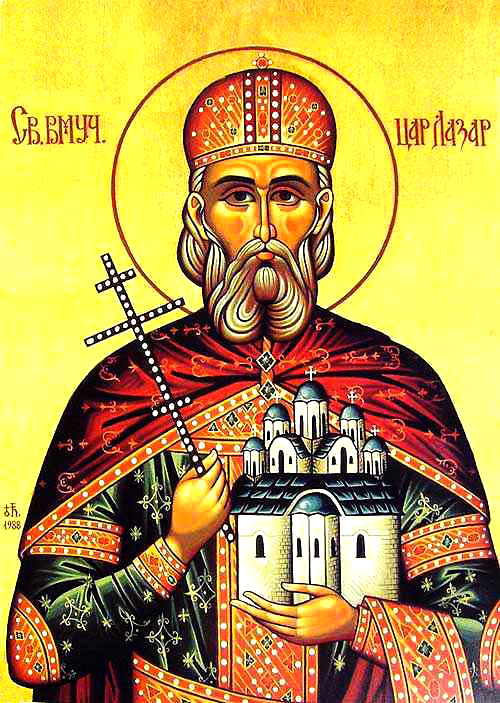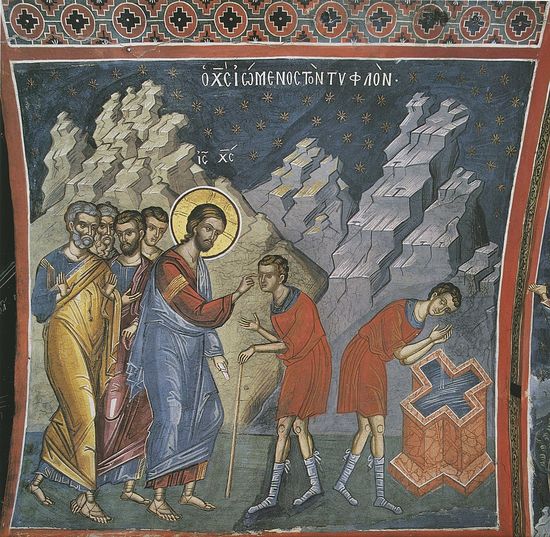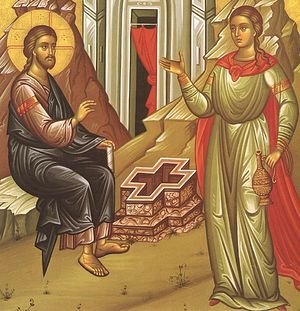Sava Trlajić (19 July 1884 – August 1941) was a Bishop of the Serbian Orthodox Church serving as Bishop of the Diocese of Gornji Karlovac in the Kingdom of Yugoslavia from 1938 until the beginning of World War II.
He was killed by Ustaše of the Nazi Germany-aligned Independent State of Croatia in August 1941. The Serbian Orthodox Church venerates him as a Saint.
He was born Svetozar Trlajić to Stevan and Jelisaveta (née Karakašević) in Mol on 18 July 1884. His education included the primary school in his hometown, a grammar school in Novi Sad, and seminary in Sremski Karlovci. He then went on to graduate from the Faculty of Law at the University of Belgrade and passed the qualifying examination for judges at the Faculty of Law at the University of Zagreb.
In 1909, he was ordained a deacon by the Bishop of Timișoara and then presbyter ten days later. As a parish priest, he served at parishes in Peška and Bašaid. Early in 1927, he was appointed to an administrative position, and later general secretary, of the Holy Synod of Bishops of the Church of Serbia. When his wife died, he took monastic vows on 27 October 1929 in the Krušedol Monastery, being tonsured with the name Sava. Soon afterward he became abbot and archimandrite of the Krušedol Monastery. On 30 September 1930, Sava was elected Auxiliary Bishop of Sremski Karlovci. He was consecrated in Sremski Karlovci by Patriarch Varnava, Bishop Emilijan of Timok, Bishop Jovan of Niš, Bishop Tihon of the Diocese of Zahumlje and Herzegovina, and Bishop Simeon of Zletovo and Strumica. As Patriarchal Vicar Bishop Sava chaired the diocesan council of the Archdiocese of Belgrade and Karlovci. Fromearly 1937, Bishop Sava chaired the ecclesiastical court. He was appointed Bishop of Gornji Karlovac on 22 June 1938, with his residence in Plaški. After the death of Bishop Miron of Pakrac in 1941, he was also named administrator of the Diocese of Slavonia.
After the Invasion of Yugoslavia and the formation of the Nazi Germany-aligned Independent State of Croatia, Plaški was first occupied by Italian forces and then turned over to the Ustashi Croatians in late 1941. Bishop Sava and nine priests were then taken hostage. On 23 May 1941, Ustashi occupied the bishop's residence and expelled Bishop Sava. On June 8, the notorious executioner Josip Tomljenović ordered all diocesan money and records to be handed over to the Ustashi. Bp. Sava refused the Ustashi order to leave his diocese and go to Belgrade. Not wanting to abandon his flock, he refused. Bishop Sava was arrested on June 17, 1941, and confined, together with three other Serbian priests and thirteen eminent Serbian laymen, in a stable owned by Josip Tomljenović in Plaški. After experiencing intense torture, Bishop Sava and the priests, Bogoljub Gaković, Đuro Stojanović, and Stanislav Nasadilo, were chained and taken to the Gospić concentration camp on 19 July 1941. There, they were tortured until mid-August. At that time Bishop Sava was taken together with 2,000 Serbs toward the Velebit Mountains. Somewhere on this mountain, he suffered a martyr’s death together with thousands of other Orthodox Serbs. The site where Bishop Sava died is still unknown.
In 1998, at the regular session of the Holy Assembly of Bishops of the Serbian Orthodox Church, Bishop Sava was glorified and entered into the list of names of the saints of the Serbian Orthodox Church as hieromartyr.
His memory is celebrated on the 4/17 of July.
God sounds out, the earth sounds out, the heavens sound out.
And the Hagia Sophia also sounds out, the great monastery,
With four hundred sounding-boards and sixty-two bells,
For each bell a priest, for each priest a deacon.
Sound for the Holies to come out, for the emperor to come out.
A voice came to them from heaven and from the mouth of an angel:
“Stop the Cherubic hymn and lower the Holy gifts,
Because it is God’s will that the City become Turkish.
Only send a word to France [the West] for three ships to come,
One to take the Cross, another the Gospel,
And the third one, the best one, our Holy Table.
Don’t let the dogs take them and defile them.”
Our Lady is shaken and weeps and cries.
“Be quiet, our Maiden Lady, don’t cry, don’t weep.
Again, in years and in time, again it will be yours.”
(The lament of the Hellenic people, which is full of hope, after the Fall of Constantinople 1453)
 As the word of God testifies, the Apostles occupy a special place in the Church—Let a man so account of us, as of the ministers of Christ, and stewards of the mysteries of God(1 Cor. 4:1).
As the word of God testifies, the Apostles occupy a special place in the Church—Let a man so account of us, as of the ministers of Christ, and stewards of the mysteries of God(1 Cor. 4:1).
Vested with equal power from above and with equal authority to absolve sins, all the Apostles will sit on the twelve thrones next to the Son of Man (cf. Mt. 19:28)
 Prince Lazar was born in 1329 in Prilepac to the aristocrat family Hrebeljanović. His father Pribac was a Logotet-secretary doing very confidential work for King Dušan the Powerful in the royal palace. Young Lazar was raised in the palace, and was respected by the King who entrusted him with the rule of two parts of his kingdom: Srem and Mačva. Lazar married Milica the daughter of an important aristocrat named Vratko also known as Yug Bogdan - a very wise and honorable man from the Nemanjic family. Lazar had three sons: Stevan, Vuk and Lazar and five daughters: Jelena, Mara, Despa, Vukosava and Mileva.
Prince Lazar was born in 1329 in Prilepac to the aristocrat family Hrebeljanović. His father Pribac was a Logotet-secretary doing very confidential work for King Dušan the Powerful in the royal palace. Young Lazar was raised in the palace, and was respected by the King who entrusted him with the rule of two parts of his kingdom: Srem and Mačva. Lazar married Milica the daughter of an important aristocrat named Vratko also known as Yug Bogdan - a very wise and honorable man from the Nemanjic family. Lazar had three sons: Stevan, Vuk and Lazar and five daughters: Jelena, Mara, Despa, Vukosava and Mileva.
King Dušan the Powerful died unexpectantly in 1355 at the age of 48. This led to a weakening of Serbia's central government. Many dukes used this opportunity to secede from the Kingdom with the land that had been entrusted to them. The young son of Dušan Uroš took over the throne and soon was killed. Vukašin Mrnjavčević proclaimed himself the King of Serbia. At this time, Turks were advancing toward the Kingdom of Serbia. In a battle on the river Marica in 1371, Vukašin was killed leaving behind him a weakened, poor and torn Serbia. Serbia was in desperate need of a gifted statesman, rich in virtue and deserving of God's Grace: a man similar to St. Sava and his father St. Stefan Nemanja who had founded the Serbian state. The Church recognized just such a man in Prince Lazar. His talent for leadership, wisdom and experience lifted him above those who would seize the throne by force and sought their own glory and importance.
 Tractate 44 on the Gospel of John
Tractate 44 on the Gospel of John
1. We have just read the long lesson of the man born blind, whom the Lord Jesus restored to the light; but were we to attempt handling the whole of it, and considering, according to our ability, each passage in a way proportionate to its worth, the day would be insufficient. Wherefore I ask and warn your Charity not to require any words of ours on those passages whose meaning is manifest; for it would be too protracted to linger at each. I proceed, therefore, to set forth briefly the mystery of this blind man’s enlightenment. All, certainly, that was done by our Lord Jesus Christ, both works and words, are worthy of our astonishment and admiration: His works, because they are facts; His words, because they are signs. If we reflect, then, on what is signified by the deed here done, that blind man is the human race; for this blindness had place in the first man, through sin, from whom we all draw our origin, not only in respect of death, but also of unrighteousness. For if unbelief is blindness, and faith enlightenment, whom did Christ find a believer at His coming? Seeing that the apostle, belonging himself to the family of the prophets, says: And we also in times past were by nature the children of wrath, even as others. Ephesians 2:3 If children of wrath, then children of vengeance, children of punishment, children of hell. For how is it by nature, save that through the first man sinning moral evil rooted itself in us as a nature? If evil has so taken root within us, every man is born mentally blind. For if he sees, he has no need of a guide. If he does need one to guide and enlighten him, then is he blind from his birth.
 Homily 33
Homily 33
Jesus saith unto her, Woman, believe Me, the hour cometh, when ye shall neither in this mountain, nor yet at Jerusalem, worship the Father. Ye worship ye know not what; we know what we worship, for salvation is of the Jews. (Jn. 4:23-27)
[1.] Everywhere, beloved, we have need of faith, faith the mother of blessings, the medicine of salvation; and without this it is impossible to possess any one of the great doctrines. Without this, men are like to those who attempt to cross the open sea without a ship, who for a little way hold out by swimming, using both hands and feet, but when they have advanced farther, are quickly swamped by the waves: in like manner they who use their own reasonings, before they have learnt anything, suffer shipwreck; as also Paul saith, "Who concerning faith have made shipwreck." ( 1 Tim. 1:19.) That this be not our case, let us hold fast the sacred anchor by which Christ bringeth over the Samaritan woman now. For when she had said, "How say ye that Jerusalem is the place in which men ought to worship?" Christ replied, "Believe Me, woman, that the hour cometh, when ye shall neither in Jerusalem, nor yet in this mountain, worship the Father." An exceedingly great doctrine He revealed to her, and one which He did not mention either to Nicodemus or Nathanael. She was eager to prove her own privileges more honorable than those of the Jews; and this she subtly argued from the Fathers, but Christ met not this question. For it was for the time distracting to speak on the matter, and to show why the Fathers worshiped in the mountain, and why the Jews at Jerusalem. Wherefore on this point He was silent, and having taken away from both places priority in dignity, rouses her soul by showing that neither Jews nor Samaritans possessed anything great in comparison with that which was to be given; and then He introduceth the difference. Yet even thus He declared that the Jews were more honorable, not preferring place to place, but giving them the precedence because of their intention. As though He had said, "About the `place' of worship ye have no need henceforth to dispute, but in the `manner' the Jews have an advantage over you Samaritans, for `ye,' He saith, `worship ye know not what; we know what we worship.'"
 Tractate 44 on the Gospel of John
Tractate 44 on the Gospel of John
 As the word of God testifies, the Apostles occupy a special place in the Church—Let a man so account of us, as of the ministers of Christ, and stewards of the mysteries of God(1 Cor. 4:1).
As the word of God testifies, the Apostles occupy a special place in the Church—Let a man so account of us, as of the ministers of Christ, and stewards of the mysteries of God(1 Cor. 4:1).
 Homily 33
Homily 33